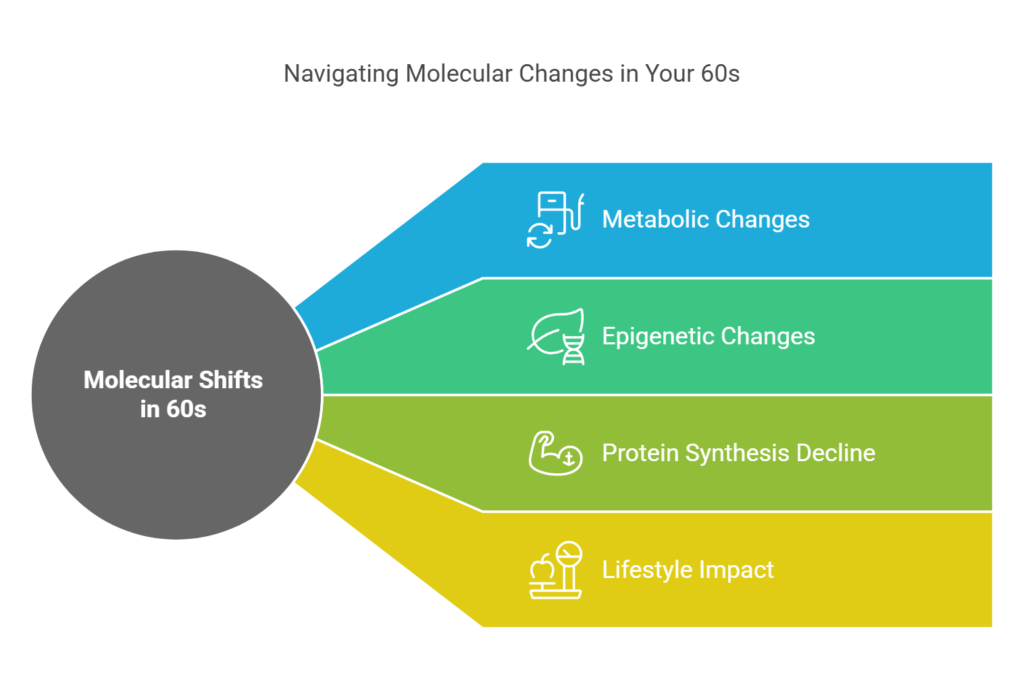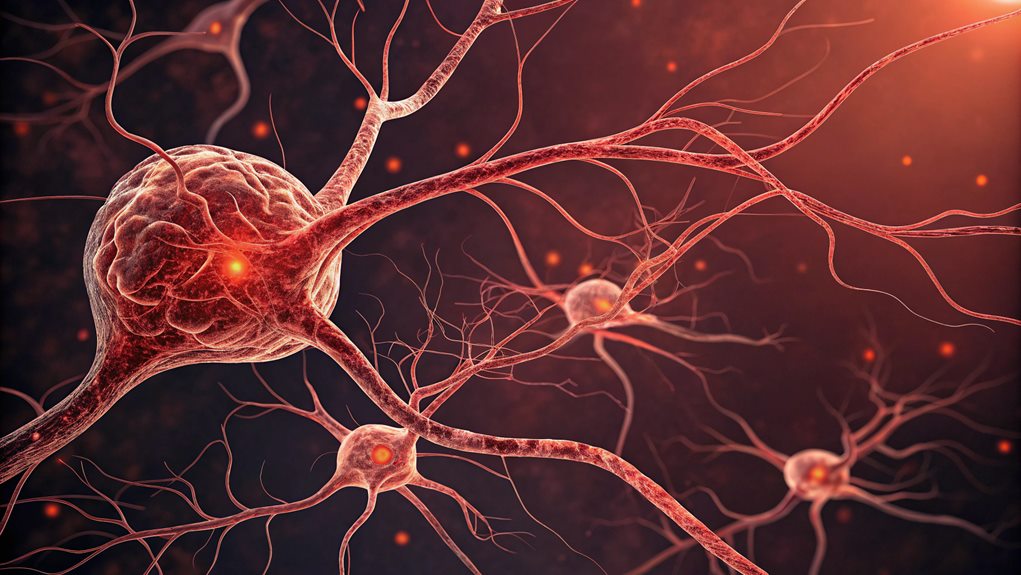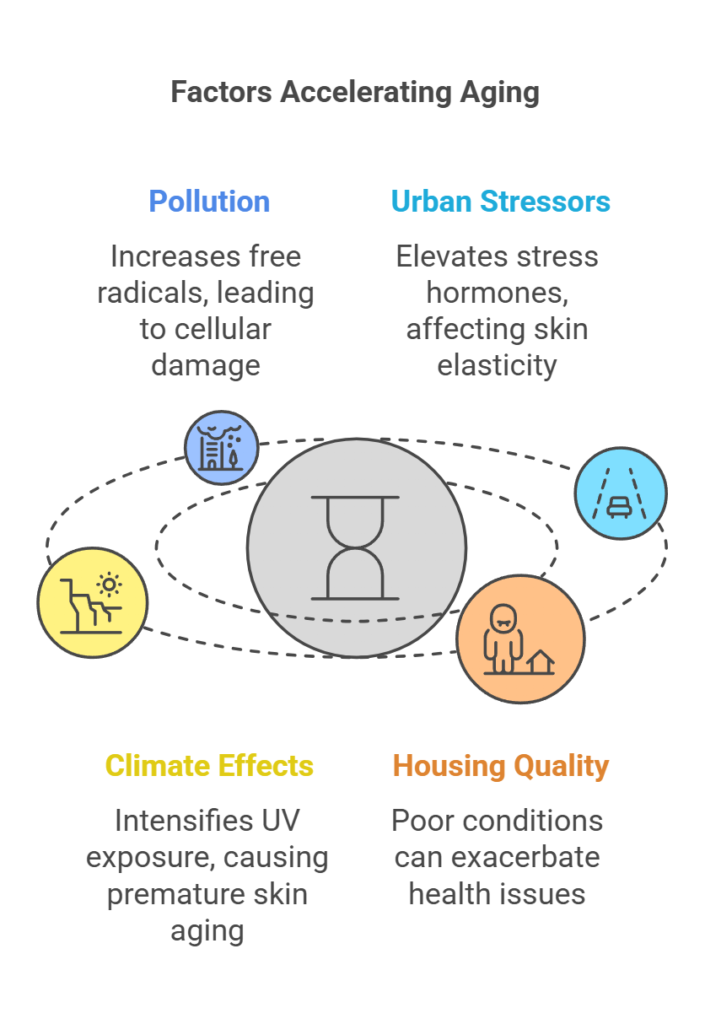What Speeds Up Ageing According to New Scientific Research

Prefer listening? Check out the podcast version of this article.
You might be surprised to learn how certain lifestyle choices can accelerate aging, as recent scientific research reveals.
Factors like a diet high in processed foods and sugars, chronic stress, and lack of physical activity are key culprits.

These elements trigger molecular changes, especially around pivotal ages like 44 and 60, challenging your resilience and health.
Additionally, environmental pollutants and lifestyle diseases increase oxidative stress and inflammation, further speeding up biological aging.
The question remains: how can you counteract these forces?
Table of Contents
Critical Age Acceleration Points
You’re likely aware that critical age acceleration points, such as the 44-year milestone and the 60-year turning point, significantly impact biological ageing processes.
Research indicates that these ages correspond to key molecular shifts, including alterations in DNA methylation and telomere attrition, which are pivotal in accelerating ageing.

Understanding the biochemical transformations at these stages can inform targeted interventions to mitigate rapid ageing.
The 44 Year Milestone Changes
Reaching the age of 44 often marks a pivotal change in the aging process, known as a critical age acceleration point.
At this stage, you might experience midlife transitions that challenge your emotional resilience due to significant hormonal shifts.
These biological changes can alter your relationship dynamics, influencing both personal and professional interactions.
Financial stability becomes increasingly crucial as you navigate these transitions, as stress related to economic uncertainty can further accelerate aging.
Prioritizing self-care practices, including regular exercise, balanced nutrition, and mindfulness, can mitigate some of these effects.
Discover Your Path to a Longer, Healthier Life!
Take our free quiz to see how your lifestyle measures up to the world's longest-living communities and receive expert tips for a healthier, longer life.
Take the QuizUnderstanding the interplay of these factors is essential for maintaining health and wellness.
The 60 Year Turning Point
As you enter your 60s, significant physiological and psychological changes often signify a critical age acceleration point.
Your age perception may shift, influenced by health misconceptions and societal norms.
Emotional well-being becomes paramount, as it directly impacts your cognitive function.
Lifestyle choices, including diet and exercise, play a crucial role in determining your biological age and overall vitality.
Consider these key elements for maintaining optimal health:
- Social engagement: Staying connected with others can enhance mental health and delay cognitive decline.
- Balanced lifestyle: Prioritize regular physical activity and a nutritious diet to support longevity.
- Mindfulness practices: Techniques like meditation can improve emotional well-being and stress management.
- Continuous learning: Engaging in new activities or education can boost brain health and cognitive resilience.
Understanding these factors helps mitigate accelerated aging.
Molecular Shifts at 60s
In your 60s, the interplay between lifestyle choices and biological processes becomes increasingly evident, marking a period where molecular changes accelerate the aging process.
Molecular biology reveals that cellular aging involves complex interactions of genetic factors.
You’ll experience metabolic shifts, which can affect how your body processes energy and repairs itself.
Epigenetic changes, often influenced by environmental factors and lifestyle, can alter gene expression without changing the DNA sequence, accelerating aging.
Protein synthesis, crucial for maintaining muscle mass and function, may decline, leading to frailty.
Understanding these shifts can help you make informed decisions about diet, exercise, and stress management, potentially mitigating their impact.
Recognizing these critical age acceleration points is key to promoting healthier aging.

Daily Habits That Fast Track Aging
You’re likely accelerating aging with certain daily habits that impact your physiology.
Consuming processed foods and sugary drinks contributes to oxidative stress and inflammation, while inadequate sleep positions can lead to musculoskeletal strain.
Additionally, chronic stress and sedentary behavior alter hormonal balance and cellular repair mechanisms, hastening biological aging processes.
Food and Drink Impact
While poor dietary choices might seem insignificant in the short term, they can significantly accelerate the aging process over time.
Your food preferences directly impact your body’s nutritional density, potentially leading to deficiencies that hasten aging.
Proper meal timing ensures metabolic efficiency, whereas irregular eating disrupts your body’s internal clock.
Hydration effects also play a crucial role; inadequate fluid intake can contribute to cellular dehydration, impairing skin elasticity and organ function.
Social dining enhances meal enjoyment, promoting better nutrient intake and reducing stress.
Flavor enhancement using natural herbs and spices boosts dietary satisfaction without harmful additives.
- Nutrient Deficiency: Skipping essential nutrients accelerates cellular aging.
- Metabolic Disruption: Poor meal timing affects biological rhythms.
- Dehydration: Lack of fluids exacerbates aging symptoms.
- Stress Reduction: Social dining mitigates stress-induced aging.
Sleep Position Problems
Although often overlooked, your sleep position can significantly influence the aging process by affecting spinal alignment, skin health, and overall comfort.
Sleep position effects are substantial; improper alignment can cause musculoskeletal strain, impacting both short-term sleep quality and long-term health.
Prioritizing spinal alignment importance is crucial as misalignment can accelerate aging by contributing to chronic pain.
Adjusting pillow height and mattress firmness influence your nighttime body posture, ensuring your spine remains neutral.
An appropriate pillow height adjustment fosters optimal neck support, reducing undue pressure.
Similarly, mattress firmness should correspond to your preferred sleep position to enhance sleep quality improvement.
A tailored approach to your sleeping environment mitigates aging effects, emphasizing the necessity of evaluating and optimizing these factors for healthier aging.
Stress Related Acceleration
Stress significantly accelerates the aging process by impacting cellular function and overall health.
You face chronic stress effects when cortisol disrupts normal biological processes, hastening telomere shortening, and oxidative stress.
By adopting stress management techniques, you can mitigate these effects and promote healthier aging.
Mindfulness practices foster emotional resilience, providing coping mechanisms to handle daily stressors.
Implementing stress reduction strategies helps maintain hormonal balance and cellular integrity, ultimately slowing the aging trajectory.
- Chronic Stress: Prolonged exposure leads to DNA damage.
- Mindfulness Practices: Enhance emotional resilience, reducing stress impact.
- Stress Reduction Strategies: Essential for maintaining cellular health.
- Coping Mechanisms: Crucial for managing life’s stressors effectively.
Incorporating these approaches supports longevity by preserving cellular function and overall well-being.
Exercise and Movement Patterns
Chronic stress isn’t the only factor accelerating the aging process; exercise and movement patterns also play a significant role.
Engaging in regular exercise benefits overall health, yet improper or insufficient movement frequency can fast-track aging.
Without consistent cardiovascular workouts, your heart and lungs may not function optimally, leading to increased biological age.
Neglecting strength training compromises muscle mass, reducing metabolic efficiency and mobility.
Flexibility exercises are crucial too; without them, joint stiffness and reduced range of motion can set in.
Balance activities help maintain coordination, preventing falls and related injuries, which can significantly impact aging.
Thus, understanding and implementing a balanced exercise regimen is vital for mitigating age acceleration, preserving functional independence, and promoting long-term well-being.
Body System Breakdown Accelerators
You’re likely aware that certain factors can expedite the aging process by accelerating the breakdown of body systems.
Cardiovascular aging is triggered by oxidative stress and inflammation, while immune system weakening is often linked to chronic stress and nutrient deficiencies.
DNA damage pathways and cellular deterioration speed are influenced by genetic predispositions and environmental exposures, necessitating strategies to mitigate these accelerators.
Cardiovascular Aging Triggers
Cardiovascular aging accelerates when various physiological and lifestyle factors converge to stress the heart and blood vessels, leading to their gradual decline.
Aging biomarkers indicate how inflammation effects can exacerbate this process, increasing the risk of heart disease.
Lifestyle interventions are crucial in preserving cardiovascular health.
For instance, adopting preventive measures like regular exercise and a balanced diet can significantly mitigate these risks.
Consider the following factors:
- Inflammation: Chronic inflammation accelerates arterial stiffness and plaque formation.
- Sedentary Lifestyle: Lack of physical activity reduces heart efficiency and elevates disease risk.
- Poor Diet: High intake of processed foods and sugars worsens cardiovascular health.
- Stress: Chronic stress elevates blood pressure, impacting heart function.
Immune System Weakening Factors
While various factors contribute to the weakening of the immune system, understanding the underlying causes is essential for mitigating their impact.
Immune response decline can result from chronic inflammation effects, where persistent inflammatory states exhaust immune resources.

Nutritional deficiencies impact immune efficacy by depriving the body of critical vitamins and minerals needed for cell function.
Hormonal imbalance effects, particularly involving cortisol, can suppress immune activity, making you more susceptible to infections.
Environmental toxin exposure, including pollutants and chemicals, can hinder immune function by inducing oxidative stress.
Stress management techniques are crucial, as chronic stress elevates cortisol levels, further weakening immune responses.
By addressing these factors, you can potentially slow immune system decline and support overall health as you age.
DNA Damage Pathways
Although often overlooked, DNA damage pathways play a critical role in accelerating the breakdown of body systems, contributing significantly to the aging process.
DNA repair mechanisms become less efficient with age, making it harder to fix damage caused by oxidative stress.
This leads to persistent DNA lesions, influencing cellular functions.
Telomere shortening effects further exacerbate aging by limiting cellular replication potential.
Epigenetic modifications can alter gene expression, promoting aging phenotypes.
Mitochondrial dysfunction causes energy deficits, triggering cellular senescence and compromising tissue integrity.
- The oxidative stress response declines, increasing DNA vulnerability.
- Telomere erosion restricts cell division, accelerating senescence.
- Epigenetic changes can silence essential genes, affecting cellular health.
- Mitochondrial inefficiency leads to reduced cellular energy and function.
Understanding these pathways is vital for developing anti-aging interventions.
Cellular Deterioration Speed
Understanding the factors that accelerate cellular deterioration is crucial for addressing the aging process.
Cellular repair mechanisms can be overwhelmed by persistent oxidative stress, leading to increased aging biomarkers.
When cells are under constant stress, the protective caps on chromosomes, known as telomeres, shorten more rapidly, indicating accelerated aging.
Mitochondrial function, essential for energy production, declines with age, exacerbating cellular damage and dysfunction.
Genetic predisposition also plays a significant role in how fast cells deteriorate, influencing the body’s ability to combat these stressors.
By recognizing these elements, you can target interventions to slow aging processes.
Enhancing cellular repair, reducing oxidative stress, and maintaining mitochondrial efficiency are pivotal strategies to mitigate the effects of genetic predispositions and preserve telomere length.
External Aging Forces
You’re likely aware that external aging forces significantly influence the rate of aging.
Environmental stress factors such as pollution and UV radiation can accelerate cellular damage, while social life impacts, including isolation or high stress, can exacerbate aging processes.
Moreover, exposure to lifestyle chemicals and physiological changes from pregnancy can contribute to oxidative stress, further hastening the aging trajectory.
Environmental Stress Factors
While environmental stress factors are often overlooked, they play a significant role in accelerating the aging process by impacting cellular function and overall skin health.
You mightn’t realize it, but environmental pollution effects can lead to oxidative stress, damaging your cells.
Urban living stressors, like noise and congestion, increase cortisol levels, which are linked to premature aging.
Climate change impact, such as increased UV radiation, can cause skin damage and accelerate aging.
Lifestyle disease links are evident, as poor environmental conditions foster chronic illnesses that age you faster.
- Pollution: Increases free radicals, leading to cellular damage.
- Urban stressors: Elevate stress hormones, affecting skin elasticity.
- Climate effects: Intensify UV exposure, causing premature skin aging.
- Housing quality: Poor conditions can exacerbate health issues, speeding up aging.

Social Life Impact
Environmental stress factors are just one piece of the aging puzzle; social life also significantly impacts how rapidly we age.
Research indicates that positive social interactions and strong support networks can promote longevity.
Engaging in community activities enhances mental well-being and may slow cognitive decline.
Conversely, poor relationship quality and loneliness effects are linked to accelerated aging, potentially due to increased stress hormones and inflammation.
Participation in social activities fosters a sense of belonging, which is crucial for emotional health.
Robust support networks provide emotional and practical assistance, reducing the negative impacts of stress.
Therefore, maintaining quality relationships and active community engagement is essential for mitigating external aging forces and promoting healthier aging outcomes.
Prioritize your social life for better aging.
Pregnancy Related Changes
Pregnancy induces numerous physiological changes that can impact the external aging process.
You experience fluctuations in pregnancy hormones, which can alter skin elasticity and hydration levels, potentially accelerating visible aging.
Prenatal nutrition is crucial for maintaining maternal health and mitigating age-related risks.
Ensuring adequate intake of essential vitamins and minerals supports cellular repair and resilience.
Postpartum recovery also plays a role; inadequate recovery can exacerbate stress on the body, influencing long-term aging processes.
Genetic factors contribute to how your body copes with these changes, affecting individual aging trajectories.
- Hormonal shifts can lead to increased skin pigmentation and changes in texture.
- Nutritional deficiencies during pregnancy may accelerate cellular aging.
- Postpartum stress can impact long-term skin and tissue health.
- Genetic predispositions influence aging responses to pregnancy.
Lifestyle Chemical Exposure
As your body navigates the changes brought on by pregnancy, external factors like lifestyle chemical exposure can further influence the aging process.
The chemical exposure effects from pollutants in air, water, and food can accelerate cellular aging.
Lifespan Comparison Tool
Compare the life expectancy by the U.S. State
Pollution’s health impact is significant, with studies linking it to oxidative stress and inflammation, both aging accelerators.
Awareness of toxic substances in everyday products is crucial.
Identifying environmental toxins sources, such as industrial emissions and household cleaners, helps mitigate risks.
Additionally, dietary chemical interactions from processed foods can compromise cellular integrity.
Implementing lifestyle modifications benefits you by reducing exposure, such as choosing organic foods and using natural cleaning products.
Staying informed and proactive about these factors is essential in managing aging’s external influences.
Conclusion
You’re at a crossroads between youthful vitality and accelerated aging.
Embrace self-care practices like balanced nutrition and regular exercise to combat oxidative stress and inflammation, while resisting the allure of processed foods and sedentary habits.
As environmental pollutants and lifestyle diseases loom, the choice is stark: proactive health investments or passive decline.
By prioritizing emotional resilience and positive social interactions, you can defy the molecular changes that challenge your health at pivotal age milestones.
Choose wisely—your future self depends on it.

 972-393-1699
972-393-1699





